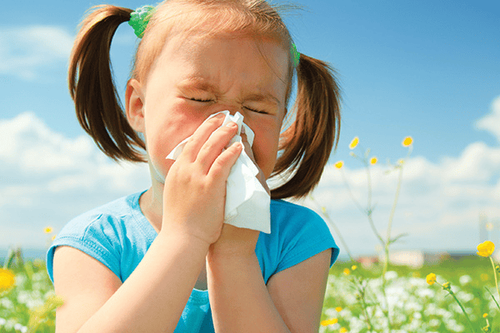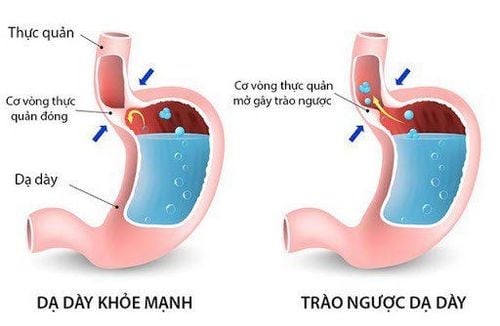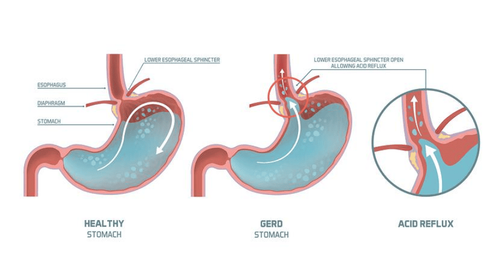This is an automatically translated article.
The article is expertly consulted by Master, Doctor Phan Thi Cam Van - Neonatologist - Department of Pediatrics - Neonatology - Vinmec Danang International General Hospital. Dr. Van has 7 years of experience as a resident doctor and a pediatrician - neonatologist at Hue Central Hospital and Hue University of Medicine and Pharmacy Hospital. Her strength is in the treatment of Pediatric diseases of Respiratory, Digestive, and infectious diseases; newborn care and treatment, neonatal resuscitation.In infants and young children, food is easy to stagnate in the stomach for a long time and creates favorable conditions to cause gastroesophageal reflux in children.
1. What is gastroesophageal reflux in infants?
When the baby suckles, milk from the mouth down the esophagus passes through the cardia and then into the stomach. Right at the heart, a lower esophageal sphincter acts like a one-way valve to help prevent reflux from the stomach up into the esophagus. In infants, the valvular muscles of the heart are weak and spongy. Therefore, when the baby sucks in the wrong position, the milk and the air in the stomach rise together, through the heart, back up into the esophagus and out.Similarly, when food goes from the stomach to the intestines, it will also pass through a valve that functions like the heart, called the pylorus. In infants and young children, the myocardium is weak, but the pylorus is well developed. Therefore, food is easy to stagnate in the stomach for a long time and creates favorable conditions to cause gastroesophageal reflux in children.
In addition, the stomach in infants is horizontal, so it is easy for children to have acid reflux. When suckling, the baby swallows air, then the baby is placed on a horizontal or right side, which is also very easy for the baby to spit out the milk.

2. Distinguish physiological and pathological reflux
If gastroesophageal reflux in infants occurs in a short time with little frequency, occurs only after feeding and does not cause any symptoms, then it is physiological reflux. Specifically, babies under 6 months old, even though they spit up milk many times a day, but they still play, suck and gain weight well, don't have recurrent wheezing... then it's likely that this is just a flu physiological reverse. This phenomenon will decrease over time.Gastroesophageal reflux disease in children will occur more often, last longer and can cause a number of clinical symptoms to varying degrees. If the child over 1 year old still spits milk, the child is slow to gain weight, anorexia, is thin, or has prolonged wheezing, recurrent pneumonia... then it is likely that this is pathological reflux. At this time, parents need to take the child to the doctor for a timely diagnosis and treatment.
Trắc nghiệm: Thế nào là trẻ sơ sinh non tháng?
Trẻ sơ sinh non tháng rất cần được chăm và điều trị thật tốt để giúp giảm nguy cơ gặp phải các di chứng về tinh thần, vận động và sự phát triển sau này. Cùng theo dõi bài trắc nghiệm dưới đây để có thể nhận biết trẻ sơ sinh non tháng và có thêm kiến thức chăm sóc, nuôi dưỡng tốt nhất cho trẻ.The following content is prepared under supervision of Thạc sĩ, Bác sĩ y khoa, Ma Văn Thấm , Nhi , Phòng khám Đa khoa Quốc tế Vinmec Dương Đông(Phú Quốc)
3. Is gastroesophageal reflux in babies dangerous?
Gastroesophageal reflux disease in children and infants, if not treated, will leave many complications as follows:
Esophagitis : Children will have esophagitis with varying degrees, in severe cases especially Barrett's esophagus, which can lead to cancer. Respiratory system affected: Children are more likely to develop persistent coughing and wheezing, and conventional treatment will not provide relief from these symptoms. In addition, the child will also have hoarseness or asthma. Ear, nose and throat problems such as: worn teeth, ear infections, sinusitis. Gastroesophageal reflux in children also causes weight loss, malnutrition, growth retardation...
4. Gastroesophageal reflux in children - How to properly care?
4.1 For Physiological Gastroesophageal Reflux If a child only has physiological reflux, this is only a temporary phenomenon in the first stage of the child's life and it will resolve on its own with time. However, if parents pay attention and know how to properly care for them, it will help reduce the symptoms and make the baby more comfortable.
For babies who are breastfed directly: it is advisable to feed the baby from the left breast first, because when the baby is just suckling, the amount of milk in the stomach is still small, so it is possible to lie on the right side). After that, the mother moves the baby to the right breast, because at this time the baby's stomach is full of milk, the baby should be lying on the left side, so that the milk can easily go down, not causing gastroesophageal reflux in the infant. . With bottle-fed babies: when breastfeeding, parents should place the bottle so that the nipple of the bottle is always full of milk. Do not breastfeed your baby when he is crying because he can swallow a lot of air, causing stomach upset. When the baby is finished suckling, the baby should be picked up in an upright position for about 15-20 minutes. Parents help babies burp by placing their baby's chest against one of the mother's breasts, the baby's face on the mother's shoulder, and patting the baby's back. Then, gently place the baby on his or her left side with the pillow slightly elevated. Parents should note, limit breastfeeding because it will make the baby easy to choke and spit up milk. Do not move your baby up and down after feeding. To limit gastroesophageal reflux in infants as well as young children, parents should divide the amount of milk and food into several times. Do not force your baby to breastfeed or eat a lot. The minimum time between feedings is 2 hours and the maximum is 4-5 hours. Try to ensure the amount of milk and food in the day of the child.

4.2 For Pathological Gastroesophageal Reflux When the above methods do not work to relieve GERD symptoms in infants, parents should take the child to see a pediatrician for a diagnosis. and find other causes of your symptoms.
Some drugs such as ranitidine (Zantac) or omeprazole (Prilosec) are commonly used to treat this, however, the main use of these drugs is to reduce stomach acid, so their effectiveness is not yet available. sure. In addition, the risk of infection with this drug is also quite high. Because acid has a protective effect on the stomach from bacteria and dangerous organisms from food and drinking water, reducing stomach acid puts children at higher risk of disease.
In case the use of drugs does not alleviate the symptoms or the child encounters other complications, the doctor will appoint surgery. However, indications for surgery to treat gastroesophageal reflux in neonates are rare.
As a key area of Vinmec Health system, Pediatrics Department always brings satisfaction to customers and is highly appreciated by industry experts with:
Gathering a team of top doctors and nurses in Pediatrics : consists of leading experts with high professional qualifications (professors, associate professors, doctorates, masters), experienced, worked at major hospitals such as Bach Mai, 108.. Doctors All doctors are well-trained, professional, conscientious, knowledgeable about young psychology. In addition to domestic pediatric specialists, the Department of Pediatrics also has the participation of foreign experts (Japan, Singapore, Australia, USA) who are always pioneers in applying the latest and most effective treatment regimens. . Comprehensive services: In the field of Pediatrics, Vinmec provides a series of continuous medical examination and treatment services from Newborn to Pediatric and Vaccine,... according to international standards to help parents take care of their baby's health from birth to childhood. from birth to adulthood Specialized techniques: Vinmec has successfully deployed many specialized techniques to make the treatment of difficult diseases in Pediatrics more effective: neurosurgery - skull surgery, stem cell transplantation. blood in cancer treatment. Professional care: In addition to understanding children's psychology, Vinmec also pays special attention to the children's play space, helping them to have fun and get used to the hospital's environment, cooperate in treatment, improve the efficiency of medical treatment.
Please dial HOTLINE for more information or register for an appointment HERE. Download MyVinmec app to make appointments faster and to manage your bookings easily.














